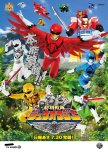
Esta resenha pode conter spoilers
Mild spoilers ahead:
Everything the show did well:-Really likeable cast from both the hero and villain side.
-The red ranger Yamato is among the best protagonists in the Sentai franchise.
-The red ranger Yamato and the extra hero Misao are better actors and voice actors than your usual Sentai. Naoki Kunishima and especially Masaki Nakao did a fantastic job. Heck, Yamato is easily a top 3 red ranger in terms of acting ability.
-Kubar had a great character arc.
-Yamato's character arc is really well done and makes one feel emotional.
-The show does a proper job at making the main antagonist Genis feel menacing and allmighty.
-The extra hero Misao is among the most unique rangers this franchise's ever had. He manages to be hilarious, menacing, cool and pathetic really well somehow. The actor does great job at making you buy that he's a schizophreniac with PTSD. (Personally he also has some of the best catchphrases in the franchise)
-Most of the monsters of the weeks are entertaining.
-Yamato, Misao and Bard have cool fighting styles.
-Really great final arc and finale for the most part.
-Really great soundtrack.
Everything the show did bad:
-Yamato and Misao definetly get more focus than the rest. It also feels like the team dotes a bit too much on Yamato which at times makes their dynamic feel more like Yamato and his pets rather than a proper team. But at least the don't get super sidelined like the other Junko Komura shows and manage to be properly developed for the most part.
-The villains in the show feel too disconnected from the show's world and the team's goal despite it attempts to reconcile both in the final arc, which makes the world-building feel cheap for most of the show.
-The villain Banglay especially feels too disconnected despite being really entertaining overall. He's also doesn't get any backstory which make his powers being so overpowered feel like cheap writing.
-Kubar is the only villain to get a really great character arc, the rest while great overall feel kinda sidelined. Naria not getting any backstory feels disappointing.
-Bard's actions don't feel justified enough.
-The action from the zyuman members of the teams is usually lacking due to them having a pretty boring utilization of their animal powers. Their instincts awakening powers are especially disappointing since they basically devolve to CGI blast effects rather than using their powers in an interesting way.
-The mechs Doubutsu Gattai ZyuohKing and Doubutsu Dai Gattai Wild ZyuohKing have pretty boring fighting styles.
-Mario feels kind of underutilized.
-The Gokaiger crossover mini-arc is just kind of allright.
-Zyuland feels largely unexplored, which wouldn't be much of an issue if Bard's backstory didn't make you question so much about them.
-It kind of feels like they Zyuman members of the team could have gotten a few more flashbacks.
-The green ranger Tusk has a considerably worse actor than everybody else, however this is really only an issue for the first arc, after that he improves enough to not be distracting. That said, as likeable the character is, he's still the worst member of the team due to the main writer being kinda bad at writing straight-man characters.
-After Misao joins it feels like team uncharacteristically forget their goal. Granted Sentai shows becoming more fillery/comedic during summer break which usually coincides with the extra hero introduction is a somewhat common trope in the franchise but since saving the world from evil monsters is secondary to them finding a way home, this issue is especially noticeable.
-The red ranger knowing how to fight despite being a zoologist. Granted a lot of tokusatsu shows have the characters suddenly knowing how to fight when they transform and it's mostly a nitpick in those shows. However when the other zyumans are trained guards yet they treat Yamato as their strongest member even before he gets his upgrade or even his form changes and have him fight alone a lot of times in the show, this kind of becomes an issue.
-The show overplays Misao's depression/insecurity jokes and since the middle mostly focuses on him and its the portion of the show with the most filler, it could make the show's middle feel really draggy for some people. I personally didn't mind this because I found Misao's jokes hilarious like 95% of the time but I know that not everybody will feel that way.
-While aesthetics are a really subjective thing, I feel there's really no excuse for the rangers suits being this simple in this season since only the red and the extra hero get form changes and instinct awakening doesn't change the suits much. ToQger at least had the excuse that all members had 5 suits.
Reasons for the show's strengths:
Main writer Junko Komura is really great at handpicking great actors. She exceeds at absurdist comedy which is why a character like Misao worked so well.
Reasons for the show's problems:
Junko Komura is kind of bad at handling multiple characters at once (which makes it ironic that she was chosen as main writer for Super Sentai 3 times) so she gave more focus to Yamato and Misao than the rest of the cast. Having said that, out of the show's I've seen written by her, this is the best she has handled characters, as the rest did get development and focus, it's just that the 2 before mentioned characters got more. She's laso kinda bad at connecting the main villains to the heroes which resulted in them feeling really disconnected from the plot.
Producer Utsunomiya requested for the plot to move slower in the show's middle which could have affected some plot points like Zyuland. There's also a rumor(?) that he requested the villains and monsters to be done safe to attract viewers since the previous Sentai season, Ninninger was received so poorly.
Overall:
A big chunk of your enjoyment will depend on how much you like this show's extra ranger which is why I feel most people would rank this show with a 7. But it's still a great time overall still and would recommend if you're a Sentai fan, just be prepared for the plot to kind of go in a standstill during the middle.
Esta resenha foi útil para você?
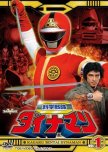
-Likeable cast for both heroes and villains.
-Dyna Black in particular is a really likeable character and also has an extremely cool fighting style.
-The direction in this show feels like the natural evolution of the directing style of the original Kamen Rider show. Looks consistently great from beginning to end.
-The show is pretty funny consistently.
-The overly ridiculous premise mixed with the usual Showa darkness makes for a pretty fun experience.
-Fun monsters of the week.
-Prince Megiddo's arc is really great.
-The cast interactions with the science center are entertaining.
-A sizeable amount of out of suit action, more than an usual toku show.
-First Sentai show to use wire action and it was used really well.
Everything the show did bad:
-With the exception of the black ranger Ryu, the other 4 rangers while likeable feel pretty generic.
-Dark Knight's fighting style kinda sucks.
-While Emperor Aton manages to do a lot of cool stuff in the final arc, he's still mostly a 'sit in the chair doing nothing' type villain, and prior to said final arc he didn't have much personality.
-Aside from Megiddo and Zenobia, the other villains are kind of generic.
-The premise isn't that unique.
Reasons for the show's strengths:
Despite the show's runtime being shortened half-way through and the team being changed from a baseball-themed into a science/dynamite-themed team fairly late into pre-production, the show's team did a fantastic job and didn't really let any of this issues affect them significantly. Producer Takeyuki Suzuki attempting to make the show more anime-esque due to his experience working in the medium worked in the show's favor.
Dynablack's actor Junichi Haruta being an ex-suit actor allowed for way more out of suit fights than usual and for said character do to of cool stuff.
This was Hirohisa Soda's second Sentai show, so they hasn't started to overlap yet.
Reasons for the show's problems:
At the time Toei listened to sponsors more than they do now so that made their shows feel troppier than they do now. But honestly Toei was great at doing ton of fun stuff despite this, Amazon, Skyrider and Black RX are the only shows that were really affected that come to mind. But I assume this is the likeliest factor for the show not being that unique.
Overall:
While it doesn't have a story that original, the show has ton of polish for the time and its monsters brong ton of life to the show. If you don't mind the show going on a pretty safe direction, this is a great time.
Esta resenha foi útil para você?
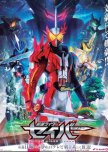
-By the end of the show every main character besides Sabella and Durandal is likeable.
-From the second quarter onward the show has consistently amazing battle choreography. The show really gives each character a really distinct and nuanced swordsmanship.
-One of the best final arcs/quarters of the franchise.
-The final main antagonist is entertaining and the reasoning behind his actions make sense.
-Really great lore and world-building.
-Slightly better acting than usual Rider shows.
-The bubbles aesthetic the show uses to portray the fantasy setting looks great.
-The show's exceeds at slice of life/human drama elements which really make you care for the cast and results in really emotional moments.
-Really great fantasy soundtrack.
Everything the show did bad:
-One of the worst first arcs/quarters in the franchise. The beginning tries to do too much for its runtime, which is made worse because the episodes has less content than an usual rider show due to having: an ending theme, stock transformations and longer recaps. This makes the show feel cluttered and it affects the action as it occasionally cuts earlier. Other aspect that makes the action worse during this arc is that the protagonist who gets most of the screentime mostly relies on bad-looking CGI magic rather than actual swordsmanship like the other riders.
On top of all of these issues said arc is incomplete due to not being able to film properly thanks to covid, so in order to get the full picture of the show, one must watch the Swordsmen Chronicles spin-off alongside the arc to enjoy the show better. Because if one doesn't watch the spin-off: Kento's actions seems dumber, one won't understand Buster and Slash relationship, why Slash wasn't being able to fight goes unexplained, Rintaro's character's inconsistent in the first arc, Rintaro would be the only one of the main quartet who doesn't have any relation to books and Rintaro actions later in the show lack weight.
The only consistent good thing in the first arc are its slice of life elements which are really well done and make pretty much every major character likeable in the beginning with the exception of Touma who's really generic and Ren who remains a jerk.
However after episode 15 the show improves drastically as it starts having better pacing, Touma starts getting an actual character and gets tons of development, Yuri who's one of the show's best characters gets introduced and Touma goes trough a training arc and learns how to use proper swordsmanship which does wonders for the choreography.
-Ren remains unlikeable until the final arc because we aren't told his backstory until then. However it felt like there wasn't any actual reason to withhold his backstory for so long.
-Sabella and Durandal remain kinda unlikeable for the whole show (which is weird considering they are really likeable in all of the show's spin-offs and specials, some of which aired during the show).
-A lot of times it feels like the cast forgets that Sophia exists which feels out of character.
-While all the main villains are entertaining, it feels like a lot of them die just when they were getting interesting.
-The monster of the week aspect in the first half is kinda hit or miss.
-Episodes 34~38 where the movie villain Falchion gets introduced into the show, return to the hectic pacing and weird editing of the first arc. (If you're worried about watching the short movie, it's just a fight and Bacht's backstory isn't actually explained, you can go into this show without watching and the show summarizes it pretty well anyway).
-It felt like the show could have further explored Ren, Yuri and Bacht backstories.
-The mix and match power mechanics are underutilized.
-Despite the final main antagonist being entetaing, having a cool fighting style and their whole rationale making sense. It's extremely difficult to take him seriously due to the actor overplaying his villain voice in the final arc.
Reasons for the show strenghts:
Producer Kazuhiro Takahashi is great at coming up with unique concepts. Main writer Fukuda is excellent at writing human drama and making you care for the characters, he's also a really great lorist. A lot of episodes are written by Keiichi Hasegawa who knows who to up the stakes and make characters likeable. The Reiwa strategy to storyboard fights continues to do wonders for the action.
Reasons for the show flaws:
The show originally had a darker, more interesting premise where Touma was vagabond who trained by himself to be a swordsman ever since he was a kid in order to save Luna, as he opposes both Sword of Logos and the megido but ultimately learns how to work alongside the organization, with a tone closer to Kamen Rider Kabuto. However due to Covid, Toei requested that shows of the super hero time segment of that year to be more light in order to cheer people up.
Covid made it so that the show couldn't have characters of the week in the beginning so to compensate the producer made Kamen Rider Kenzan, Buster and Slash appear earlier, how the show still needs to shill toys so he replaced what would have been Saber's alternate weapons with their transformation devices. This meant that the characters would be introduced earlier making the show feel bloated while also not being able to do a proper introduction since they need to add a new form for Saber the same episode they are introduced.
Since it was possible that Saber could enter a hiatus like Zero-One, the producer impromptuly came up with the character Tassel, a narrator that would do longer recaps so that people don't feel lost in the plot. Originally the v.a. who voiced the transformation device was supposed to be the narrator.
The producer shoehorned a combo mechanic and a dragon motif instead of being just books/arthurian legend like it was initially supposed to due to OOO and Agito's anniversary respectively.
The producer barely allowed main writer Fukuda to actually write episodes and he basically mostly served as the show's lorist and the writer for the Kento and Ren focus episodes. This wasn't that bad since secondary writer Hasegawa is great, but Fukuda writing more episodes could have resulted in the show feeling more unique.
Overall:
If you care more about a show being consistent then this show will probably be a 6/10, if you value acting, writing and direction overall then it would probably be a 7. This show definitely does more good than bad and after the initial bad arc improves drastically and ends up with one of the best final arcs in Kamen Rider. However having to stomach the first 15 episodes + having to watch the Swordman Chronicles alongside it is a big turn-off, especially since it's not like the show's perfect after episode 15 as it has quite a lot of nitpicks plus episodes 34~38 have a similar feel to the first arc. But at the very least it's mostly an enjoyable time, personally really like the themes and characters which is why I'm giving it an 8 and as of 2024 it's the Reiwa rider show with the best plot so far.
Esta resenha foi útil para você?
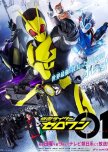
-Most of the cast is consistently likeable.
-The action is consistently amazing and some of the franchise's best.
-The case of the week each focusing on a different humagear helps the world-building and makes it feel more a alive and concise.
-The concept behind the main antagonist is really interesting and of the franchise most unique, which also leads to one of the most 'different' final arcs in this franchise.
-First quarter of the show is consistently really great.
-Amazing soundtrack.
-Izu is one of the best main girls the franchise ever had.
-Interesting depiction of A.I. when compared to other attempts in media.
-One of the best final fights in the franchise.
Everything the show did bad:
-The show's second arc is kind of mediocre. While the humagears are mostly still enjoyable and everything relating to the character Fuwa is well done and really interesting, the arc's main antagonist Gai Amatsu is really bad and the new monster of the week introduced the raiders are very hit or miss.
Essentially the show tries to play off Gai as this evil mastermind but barely any of his plans are actually intelligent and generally makes the cast feels dumber than they actually are. The raiders are mostly made to be completely unlikeable which feels like a step down from the first arc. Also the show shifts from cases of the week to two-parters which would work if they were actually doing something interesting with this format, but for the most part it just slows down the pacing for the worse since it's mostly doing this for the raiders.
-The one time a humagear of the week is seemingly legitimately evil (which also happens in the second arc) it's barely actually explained or acknowledged by the hero cast which comes of as weird and hypocritical to the show's message.
-Gai Amatsu's main goal is pretty boring.
-There's a character redemption during the third arc that feels really cheap, especially because it happens the episode after we're shown the character is even more irredeemable than it originally seemed.
-Yua Yaiba not having backstory hurts her character and makes here less interesting than most of the cast despite not being a bad character overall.
-The show lacks slice of life scenes to further the cast relationships and show more of their interactions.
-Plot points like Aruto's father and grandfather, while not overly necessary for the plot, they are relegated to the movie Reiwa First Generation. And even then, it doesn't properly explains some of his grandpa's actions. (Highly recommend watching the movie if you liked the show, it's really great).
-Characters like Naki, Raiden and Jun get heavily shafted. Granted this was mostly due to covid reducing the episode count.
-The show has a lot of dropped plot-points due to the covid rewrite. This forces one to watch the Project Thouser special in order to get all the answers, which makes the show feel incomplete, at least one can watch them after the show with little issue without breaking the show's pacing.
-Despite the pretty amazing final arc and final fight, the finale kind of turns Aruto into an hypocrite and makes the hunagears feel more negative than positive which makes it feel like the show ended on a whimper. The sequel movie RealxTime kind of fixes this but it sucks that one has to watch a movie in order to get a proper emotional closure for the show.
-After Fuwa's character arc is resolved in the second arc, he kind of gets relegated to comedy character that doesn't have much to do with the actual plot. I personally didn't mind this because he remained enjoyable from start to finish and kept having cool moments, plus I didn't feel these moments erased all his character development. But I've seem some people finding issue with this so felt like pointing it out.
Reasons for the show strenghts:
In order to differentiate the Reiwa era from Heisei, from this point onward the franchise decided to storyboard its fights which did wonders for the action. Producer Omori wanted to make a more unique world which led to the idea of the Humagears. Main writer Yuya Takahashi excels and making a fast paced show which led to an amazing first quarter. Due to covid-19 causing a hiatus and reducing the episode count, main producer Omori gave main writer Yuya Takahashi complete creative freedom for the final arc, which resulted in one of the most interesting and different ones of the franchise and made the main antagonist more unique.
Reasons for the show flaws:
Due to this being a milestone show, Omori decided to take fan feedback in order to make the show better but this pretty much caused most of the show's issues. First Metsubojinrai was only supposed to have 2 members but since a lot of people theorized that it had 4, he forced the creation of new two members, this really helped Fuwa's character arc.
The second change was that since the humagear of the week had such a positive feedback, he came up with the idea to delay the 'Hiden Manufacture' plot-line which would have been the start of the second arc and make it happen in the third arc. This was so that the show wouldn't have such a massive change of status quo so quickly, in order to realize this he came with the idea of a job competition arc and have new humagears appear alongside the raiders, however but him and Takahashi struggled to make this idea interesting which led to the problems with the second arc.
After said arc there was a lot of negative feedback for one of the show's villains, this resulted in Omori requesting a redemption however for some reason the staff decided to keep most of his evil deeds in the third arc which made this redemption make less sense, also the redemption itself was sloppily written. This redemption was originally supposed to have negative connotations, however covid-19 ended up reducing the episode count which led to the final arc being rewritten and said plot point being dropped which made the redemption feel even cheaper. The rewritten final arc only focused on the most important characters which led to the two members of Metsubojinrai being shafted and also leaving bunch of plot points open and forcing a rewrite for the part two of Project Thouser in order to close them. The hypocritical ending apparently was always planned from. The beginning for some reason, so the virus delaying RealxTime actually helped the movie be even better. Also Yua Yaiba backstory was cut for unspecified reasons, I assume for pacing reasons it was moved from the 3rd arc to the final but then was removed when the covid rewrite. I've seen some people argue that it was because it was too dark, but even post-earthquake OOO was darker so I doubt that, either way her backstory ended up being included in the Zero-One Others spin-off.
Also just a general flaw of Takahashi's writing is that he tends to run out of ideas for the secondary rider and due to his breakneck-paced style of writing his characters don't get enough downtime to have proper slice of life moments.
Overall:
The show is an enjoyable show overall but very heavily flawed. While the first and last quarter are mostly amazing, the show's middle drags a lot, the ending does a lot of harm to the main protagonist character and the show overall feels incomplete due to Project Thouser being necessary to close off the plot points and RealxTime to get proper emotional closure. That said the show has ton of interesting ideas and a mostly likeable cast which leads to most of the show being fun. Also Project Thouser, Reiwa First Generation and RealxTime are good specials so if you liked the characters and concepts it's pretty much a must-watch and builds upon the show's ideas. Just, under no circumstances, watch the Zero-One Others duology, as it ruins the RealxTime ending, has surprisingly poor direction and action and the AIMS one is generally considered to be one of the worst movies in the franchise. The show probably deserves a lower rating like 6 but I liked its concepts enough to give it a 7.
Esta resenha foi útil para você?
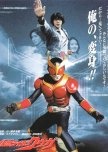
Esta resenha pode conter spoilers
Mild spoilers ahead:
Everything the show did well:-Every character in the hero cast is likeable and useful.
-Villains are menacing and feel like a real threat.
-Consistently amazing action and stunts.
-Properly ups the stakes with each following arc.
-Solid world-building.
-Great balance between a light cop J-Drama, slice of life, tokusatsu action and horror from lovecraftian-like serial killers.
-One of the best final fights in the franchise.
-One of the best power systems in the franchise. Godai has all his powers from the beginning but doesn't know how to use them due to getting them with no context, having him to practice his powers and his friends to decipher glyphs explaining the lore and the powers of the arcle to properly know how to use them
-The world has a more 'real' feel than other rider shows.
-The cops manage to continously feel useful and keep up with Kuuga despite him being the only one with transformation powers.
-The cop partner relationship of Ichijou and Godai is really well done.
-Has good re-watch value due to the main villains having a different language.
-Better acting than most rider shows.
Everything the show did bad:
Honestly most of these are nitpicks.
-Due to wanting to make a lovecraftian villain that the viewer cannot properly understand, the main villain feels kind of plain as most of the destruction he causes happens off-screen and doesn't get a proper character. But despite this flaws he feels properly menacing.
-The shift from normal J-drama stuff to hardcore murder done by tribal monsters can be jarring at times. Especially in the Jean/Enokida episodes.
-The CGI feels really dated, but it is used sparingly and honestly CGI pretty much always looks bad on Toei's mainline toku with the exception of Hibiki, kinda King-Ohger and seemingly the upcoming rider show Gavv?
-The show being shot differently from any Toei toku which can feel alienating for toku fans but it's not really a bad thing just different.
-Having multiple scenes where you don't know what the characters are saying can be tiring for some viewers.
Reasons for the show strenghts:
Kamen Rider creator before passing on wanted to make this show unlike any that preceded it. Ishinomori production recommended producer Shigenori Takatera to do so as well. This along a bunch of other factors resulted in this unique setting. Takatera and director Ishida really wanted actor Joe Odagiri to be Kuuga, and went with a more J-drama approach to its direction since it was what he preferred. Producer Takatera ideas often clashed with Takeyuki Suzuki's ideas but they ultimately managed to have a good balance of both. There's more factors but it would be to many to list, but overall Kuuga had a way different approach to previous shows and slightly more budget than usual which lead to the show being as great as it was.
Reasons for the show flaws:
The main writer Arakawa wanted to keep the details of the main antagonist vague in order to make him creepier, he succeeded in making him menacing but makes him a more boring antagonist when compared to other villains in the franchise.
Overall:
While not my personal favorite, I feel that this is objectively the closest to a perfect rider show. It just doesn't have any big issues. I would recommend the show to pretty much any Toku fan or even a cop drama fan that has never watched tokusatsu, since it's pretty much a cop drama with superpowers. I could only see people not enjoying this show if they really despise a genki-type protagonist and the flow of a cop dramas.
Esta resenha foi útil para você?
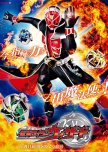
-The two main riders, Haruto and Nitou are constantly charismatic and pretty funny.
-Gremlin is a really memorable villain.
-Phoenix was a pretty entertaining villain.
-Action is consistently amazing.
-Some episodes can be really funny and endearing.
-Final arc cam be kind of interesting due to the reasoning behind the antagonist actions and the arc of the mages.
-The rings add very varied moveset of abilities for Wizard.
-Pretty good finale.
-The crossover epilogue is entertaining.
-The acting is overall pretty good.
Everything the show did bad:
-Nobody in the hero sidecast is compelling. Rinko and Shunpei while initially likeable, they barely get to actually do anything and their character arcs stay at a stalemate. Shigeru is never given enough of character or barely any semblance of a backstory. The 3 mages are an interesting concept, particularly Mayu backstory but all of this happens so late in the show that it feels really rushed and poorly executed. The donut shop are just gags characters. The only character that was given something was Koyomi, and even then she's mostly a plot device than an actual character.
-The Phantom are among the most boring villains in the franchise. They barely have anything interesting going on which makes the episodes feel pretty boring. This wouldn't be much of an issue if the sidecast had strong personalities to compensate but they really don't. And since most of the show is filler, them being boring monsters make the show generally feel like a drag.
-When the show finally moves the plot forward in the final arc, it's extremely rushed and tries to do too much at once making it feel really messy.
-Wiseman plan to achieve his goal is too conveluted.
-Medusa's reasoning for following Wiseman is kind of dumb.
-Despite Haruto and Nitou being likeable they barely get any proper backstory or character arc. They are just interesting enough to bring life into the show and have a great dynamic but they aren't a particularly amazing set of characters.
-Comedy can be very hit or miss.
Reasons for the show strenghts:
Director Nakazawa wanted to go all out in order cheer people up due to the earthquake and make you want to watch the show continously. The characters that secondary writer Komura focused were really entertaining.
Reasons for the show flaws:
Main writer Tsuyoshi Kida had scheduling issues which resulted in him barely writing or supervising the script. Producer Utsunomiya had secondary writer Junko Komura run the show on automatic without actually progressing the plot since he expected Kida to be back on time. On top of this Komura without supervision tends to only focus on a few characters, thus she only really focused on Haruto, Nitou and Gremlin. While this caused Gremlin to be a fantastic villain, everyone else got sidelined (It's unclear how many of Gremlin's ideas were made by Komura or were part of Kida's story draft but seemingly it was the latter?). Ultimately Komura ended up writing so much of the show that she's occasionally credited as Wizard main writer. Ultimately since Kido wasn't supervising we couldn't get that supposed "lovecraftian nature" he wanted to portray in the phantoms. The show would ultimately get extended but this happened so late the already rushed final arc was already in motion, which is why the finale ended up being a crossover.
Overall:
This is the most consistently boring show in the Kamen Rider franchise. And one cannot give it the benefit of being average due to even the story being rushed and conveluted in the final arc. I can only recommend this show if you REALLY like Haruto and Nitou, and if you REALLY like the action. If you like both enough, you can probably tank through the show while having a good time, but otherwise it will be an average watch at best and a bad one at worst for most people.
Esta resenha foi útil para você?
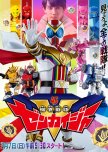
Esta resenha pode conter spoilers
Mild spoilers ahead:
Everything the show did good:-Extremely likeable cast of characters from both the hero and villain side. Even side characters.
-Pretty great action.
-Consistently hilarious from start to finish. Managse to make the jokes funny by themselves in spite of being filled with references from past Sentai, but also rewards one for having knowledge of past Sentai shows.
-Great finale.
-Excellent acting in both the comical and dramatic scenes.
-Manage to make the monster of the week feel like a world-level threat in spite of being extremely goofy.
-Hakaizer and Stacy storyline are really entertaining and emotional.
-Aside from Zenryoku Zenkai Gattai Zenryoku ZenkaiOh, the mecha fights are more entertaining than usual.
-The world being fused with Kikaitopia makes the setting feel unique.
-The team doing an unique roll call every episode is fun.
Everything the show did bad:
-The kikanoids rangers feel heavily shafted compared to Kaito, Zox and Stacy. Makes them feel more like the sidekicks of Zenkaizer rather than a proper Sentai team.
-Gaon specifically feels even more shafted because he doesn't get a proper backstory to give weight to his hate of kikanoids.
-The true main antagonist kind off came out of nowhere.
-As funny and likeable the villains are, aside from Stacy and Hakaizer they still feel kinda shafted, especially Boccowaus which felt that he couldn't use most of his powers.
-Zox's storyline feels pretty detached from the overall plot.
-The final mech Zenryoku Zenkai Gattai Zenryoku ZenkaiOh pretty much never looks well on screen.
-Stacy loses too many battles to be taken as seriously.
-Stacy storyline gets dragged. Personally didn't mind it because the show continued to be entertaining but it's still an issue.
-One could argue that Zenkaiger powers don't have much identity since it's just powers based on past rangers. As opposed to the previous show that had power like these where their pirate abilities and stylish fighting was more prominent than their legend powers.
-Having the powers of all previous Sentai from the beginning without having to earn them may feel cheap for some viewers. Especially considering that the previous crossover anniversary show Gokaiger had to earn all the mech powers.
Reasons for the show strenghts:
Producer Shirakura wanted to make the show stand out and came up with a crazy setting. Junko Komura is really good at choosing cast members. Kaito and Stacy actors especially are really good.
Reasons for the show flaws:
Producer Shirakura wanted to emphasize dimension travellings but Covid made it so that they had limited sets available, thus only being able to do that for a few episodes. Main writer Junko Komura was brought over after almost every single core idea of the plot had been decided so she had less freedom. While I understand why Shirakura chose Komura due to the setting being similar to Zyuohger and Akibaranger where she was heavily involved in both, she's bad at handling multiple characters, so she only really focused on Kaito, Stacy and Zox while leaving the other characters behind. The true main antagonist coming out of nowhere happened due to a controversy with one of the villains' voice actor, forcing a retcon as to why it had multiple manners of speech.
Overall:
The show is objectively a 7/10 due to the underdeveloped cast. But the comedy is on point, it's not the funniest Sentai as Carranger had it beat on that regard, but the show never had any big issues to drag it lower. However comedy is subjective, I recommend to watch the first 3 episodes and if you liked the comedy stay watching, just don't go up excepting a particularly complex plot.
Esta resenha foi útil para você?
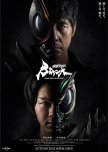
-Really cool action overall that feels very 'raw'.
-Prior the final episode, the majority of the cast is entertaining.
-Pretty good plot and setting overall.
-The rivalry between Kotaro and Nobuhiko is entertaining overall.
-Really cool world-building.
-With the exclusion of the final episode, the show manages to be consistently entertaining.
Everything the show did bad:
-One of the worst finales this franchise has ever had. The last 10 minutes of the show somehow manages to ruin most of the cast, especially Aoi and ruins most of the set-up the show had done up to that point. The finale comes off as the characters just being really dumb and out of character suddenly to make the finally unnecessarily bleak. This personally made the show feel like a waste of time in spite of me really enjoying the show prior those last 10 minutes or so.
-The character played by the ex-rapper of ALI Jua feels really out place despite being a kinda likeable character overall. His overall personality feels like it doesn't fit with the show's tone and his actions don't really make much sense considering his backstory.
-Some of the political elements of the show feel kind of out of place at times and kind of disconnected from the show's messages.
-Some characters feel unnecessarily scummy at times due to their lack of backstory.
-While the cast is indeed likeable overall prior to the finale, they really aren't anything that amazing or stand-out.
There isn't enough info on the production to know why the show ended this way. There's rumors that Amazon Prime, the platform on which this show was released, requested the political elements in the show and that the weird ending was done as a sequel hook. But all of this info is unconfirmed and currently there's no way to know.
Overall:
I could see people giving this show a 6 or even a 7 due to the show being enjoyable for the most part but I just don't feel right recommending this show due its horrible finale, especially when there are far better tokusatsu and action horror shows out there. I can only recommend this if you're really starving for an action horror show since that aspect is done particularly well in this show or if you're a Kamen Rider completionist, just be prepared for an awful finale.
Esta resenha foi útil para você?
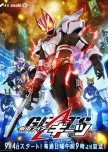
Esta resenha pode conter spoilers
Mild spoilers ahead:
Everything the show did well:-Really likeable cast overall.
-Consistently amazing action and battle choreography, arguably the franchise's best.
-Great jazzy soundtrack.
-Really interesting twists and plot developments.
-Most the side Riders that only last one arc manage to be memorable and likeable.
-Aside from the main antagonist, while not really impressive the villains in the show all manage to be pretty memorable and likeable.
-Great final episode.
-The show has a lot of style to its direction.
-The gimmick of having the Riders participate in games makes every two-parter and battle really memorable and different from other tokusatsu.
-Extremely good use of form changes.
Everything the show did bad:
-Girori and Ace's characters and acting feel kind of inconsistent at times.
-The show's writing quality drops in the second half. In the third quarter Keiwa barely gets to do anything and Neon does some really dumb decisions. In the last quarter the conclusion to both characters' arcs start and finish there, while their arcs make sense and were properly set up and foreshadowed in the first half, they happen so fast which makes their emotional weight lacking. The second half is also lacking due to the show having one of the most generic and forgettable main antagonist in the franchise.
-Despite the rest of the villains being individually likeable, there's too many of them around simultaneously to be properly developed.
-While Michinaga is a likeable character overall, the show tries to paint him as an anti-hero which doesn't really work since there was no way for him to know the truth behind his actions.
-The cast barely critizes Neon for her actions in the second quarter which makes a lot of the aspects of said arc feel like filler.
-The show feels overly critical of Keiwa's way of thinking. While he's extreme and naive, due to the nature of the deaths of the people he wants to revive it feels like there's hardly anything wrong with his goal, it's just his actions in the second half that's a problem. Yet even prior Keiwa's wrongdoings the show treats him like a punching bag and as if his goal is too naive despite making sense which makes Ace feels like an hypocrite at times.
-Hallelujah Win feels heavily sidelined.
-The world of the supporters/sponsors doesn't get explored enough and it's mostly just left to the 4 Aces movie.
-While not strictly necessary for the plot, a considerable amount of Hallelujah Win's and Niram's character development and world-building is left to the Kamen Rider PunkJack special.
-Tsumuri feels underdeveloped.
-The Riders motif feel pretty boring and basic compared to other seasons.
-The show has artificial humans as a plot point, which isn't a bad thing but since the 3 Takahashi Rider shows aired so close to each other it makes this plot point feel repetitive if you're watching the seasons in order.
Reasons for the show strenghts:
Main writer Yuya Takahashi learned from his past mistakes and actually did think the secondary rider character arc and gave the characters downtime for them to interact while still keeping his fast-paced style of writing. He made a really interesting setting.
Reasons for the show flaws:
Takahashi wanted to make too many villains simultaneously which made it so the villain cast isn't properly developed.
The staff didn't properly tell Ace and Girori's actors how their characters were supposed to be because they were afraid they would spoils plot points, so their characters are kind of inconsistent.
The show's toy manufacturer Bandai changed the show's second half for the worse due to delaying the cast upgrades. This resulted in Keiwa and Neon not getting much to do in the third quarter and their arcs concluding really fast without having proper weight. This also resulted in Hallelujah Win not being able to transform into Punkjack since they repainted his suit for Neon's arc but said repaint ultimately ended up being used in the final quarter rather than the third, making it so they weren't able to repaint it back on time. This rewrite also force them to change who the main antagonist was supposed to be, which resulted in the impromptu boring antagonist Suel.
Overall:
The show is the most 7/10 show in the franchise which makes it an excellent show for a beginner to Kamen Rider I guess. It's just great and interesting enough to get you watching but it has enough flaws to keep it from being a really great show so it will get you excited for other shows in the franchise. Overall pretty great show but not really a stand-out one.
Esta resenha foi útil para você?
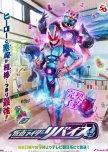
Esta resenha pode conter spoilers
Mild spoilers ahead:
Everything the show did well:-The show first half is really great overall. Most characters are likable during that period, and the general tone and atmosphere feels great.
-Episode 42 was amazing.
-Pretty good finale.
-Daiji's actor is great and has excellent delivery for his scenes.
-Lovekov is a pretty loveable mascot.
-The action in the first half, excluding the CGI forms, is really well done and different from other shows as it feels like controlled chaos.
-The music in the first half is among the franchise's most unique.
-The first quarter of the show has more budget than usual.
Everything the show did bad:
-The mysteries and character arcs setup in the show's first half get resolved either boringly or just straight up bad.
-By the end of the show barely any character remains likeable and the ones that do aren't really anything impressive, just 'good'.
-The main protagonist Ikki is a very boring character overall, and his partner Vice doesn't really feel like a co-protagonist and just feels like a mascot. Their character arc is only interesting in the finale. Ikki in the beginning is busybody type character and has good detective skills but by the second half he stops doing any of this for the most part, while letting his siblings resolve their own problems is unique it barely gives him a chance to develop character.
-Daiji is the worst part of the first arc because his rivalry with Ikki feels repetitive, that isn't much of an issue and he remains pretty likeable during the first half but after he obtains his upgrade Holy Live his character just keeps getting worse. Most of his actions in the second half stem from fear of the main antagonist but said antagonist doesn't come off powerful enough which makes most of his decisions feel nonsensical. Also the rest of the cast are jerks to him for seemingly no reason.
-Sakura is really likeable before becoming a rider, but once she does she becomes a brat. This would be fine since they're clearly setting up her developming maturity after being smug and in the first arc they manage to make some interesting things with this. However the show despite her barely winning any battles and being a smug brat who has yet to know her place, almost every character sucks her off as if she's somehow amazing. When it's time to resolve her arc it happens mostly off-screen which feels like a cop-out.
-The main antagonist Giff is only likeable when he was a statue. Once he becomes a proper monster he loses all of his personality and his actual plan is really dumb.
-Julio and Aguilera become joke characters with barely any direction after episode 18.
-Most of George character arc in the second half feels forced and contradictory to his personality in the first half.
-Hiromi, Genta, Bu-san, Kagero and Olteca remain the most likeable characters because they remain mostly absent in the second half where the show went bad and you bet that when they appear later in the second half the show tries its best to ruin them.
-The action degrades heavily in the second half for several reasons. There's barely any new enemies and they mostly spend fighting Veil and Giffdemos, the new riders introduced barely have any character at all so they don't have an interesting moveset and the powers the main cast get from their upgrades feel detached from the initial themes.
-For the second half of the show they mostly use more generic sounding action music or old tracks from the first half. All new tracks that are actually unique get barely used.
-The eviction plot-line gets forgotten.
-The shot in the opening of the main protagonist in a flaming school never happens in the show, it's the only time that I can think of in the franchise were the show opening seeminly hinting at a plot point goes nowhere.
-One of the worst final arcs in the franchise.
-The show is worse on a re-watch since now you know that the mysteries and set up aren't actually building up to anything.
-Weird anti-vaccine message episode.
-The show does a poor job at making the main antagonist Giff feel powerful or even menacing.
Reasons for the show strenghts:
Producer Mochizuki has ton of interesting ideas, good set of directors.
Reasons for the show flaws:
Producer Mochizuki puts all of his good ideas in the first quarter which makes it feel kinda cluttered and also makes him go overbudget. After the first quarter he pretty much gives the main writer complete freedom. Keep in mind this is the same strategy he used in his previous show Kyuranger which resulted in him being demoted, he was promoted again and given a second chance since it have been a long time since that show, but this shows he pretty much didn't learn anything, which resulted in him getting demoted again inmediately after the show ended.
The writer who gave complete freedom, Hanta Kinoshita, didn't really care for any of Mochizuki's ideas nor actually likes Kamen Rider, he's more of marvel comic fans. After the first quarter he pretty much retconned everything Mochizuki and director Shibasaki had set up without any actual planning. He publicly admitted that he didn't have anything planned for the main protagonist duo nor the deadmans past episode 18 and had nothing planned for Daiji past episode 27. His only focus pretty much was Sakura and Weekend. All of these decisions made him ruin the show's second half with the exception of episode 42. It legimetely seems that he was angry that his idea of a female protagonist was rejected and that Hiromi, a character that was supposed to die in the first episode before the script being changed because the staff liked the actor, ended up being more popular than Sakura and Vice. Kinoshita also inserted his own political views into the show. The writer just generally comes off as petty.
Besides that, the character Hikaru who had barely done anything suddenly changing and becoming prominent in the second half despite having no personality, is heavily speculated to have happened due to him being from a profilic agency and that the staff was forced to give him more screen time.
Due to Sakura being so poorly written and her arc being resolved off-screen despite the writer's insistance that she's his favorite character one has to assume that something that we're not aware of happened in production.
Overall:
If you care about consistency this will most likely be an average show due to the first half being really great and the second being really bad. If you care about writing quality this is easily one of the franchise's worst. One cannot really get a feel for the characters and story by watching the first 3 episodes due to how much the show changes. I honestly cannot really recommend this show when the tokusatsu genre has other much better titles.
Personally since my biggest draw to shows are characters, this is the worst Rider show I've seen so far. In Wizard Haruto, Nitou and Gremlin at least were really likeable. In Ghost Alain was amazing, only the 2 dudes from the temple were boring, and Chikara and Adel were really bad, but otherwise the cast was enjoyable. Zi-O had Woz being really fun, and while the character writing was heavily inconsistent they at least were entertaining and had some interesting concepts done well. Revice really has none of that going for it.
Esta resenha foi útil para você?
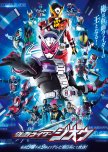
-The hero cast while inconsistent is pretty likeable overall, especially Woz.
-Some really cool concepts that are done really well like the whole Demon King aspect or some elements in the second quarter.
-The show's second quarter manages to be really great for the most part.
-Pretty good main antagonist.
-Amazing final fight.
-Great action for the most part.
-Really great soundtrack that stands out from other seasons.
-Consistently entertaining show for the most part if you don't take it too seriously.
-Some of this show's tributes can be pretty good. The Agito, Ryuki, Blade, Hibiki, Kabuto, Kiva, OOO and Wizard come to mind.
-Good utilization of Kamen Rider Decade's characters.
Everything the show did bad:
-This show has some of, if not the most inconsistent writing in the franchise. A lot of stuff gets retconed and the main trio personalities flip-flop from time to time, especially with Geiz.
-Woz backstory and the Dai Mazine plot points are left to this show's summer movie. But even then the show barely uses Woz's background for the show nor does explore how was he during Geiz's time.
-The time-travel stuff is really wonky and inconsistent. Like when Riders are finally able to coexist with the Another Riders is something that happens on a whim and the show doesn't explain how it works (it's only explained in the show's official blog, not even in a spin-off).
-The show never explains Uru's and Ora's backstories which makes near impossible to care for them (their backstory is only told in an interview with the producer for some reason, not even in a spin-off).
-How Geiz gets over the negative effects of Geiz Revive is never explained (It gets explained on the show's official blog). Even though other toku also do this, in those you can see the gradual tolerance of the effects, in this show he just suddenly gets over it relatively quickly.
-The Kamen Rider introduced in the last 2 episodes of the show feels pointless.
-When Kamen Rider Aqua from the OOO movie crossovers is introduced into the show he's used poorly.
-Some tributes, especially the first two really suck and the Build one makes zero sense. Even some of the good ones like Kabuto feel like they miss the point of the characters' development from that show. The Kiva one starts good but gets interrupted by the Ginga plot-point that comes out of nowhere. The Wizard, Gaim and Ghost ones while not bad feel like they barely do anything interesting with the characters from previous shows. And one might argue that the Blade's tribute ruins that show's ending but that last one is mostly subjective.
-The show's finale might feel like a copout to some people.
-The show requires you to have passing knowledge of the past 18 Kamen Rider seasons, which isn't really a flaw but felt like it should be point out.
Reasons for the show's strengths:
Main producer Shin-ichiro Shirakura originally intended for the show to stop focusing on the 'crossover' aspect after the first arc, so from episode 15 to episode 27 the writing quality improved drastically.
Main writer Kento Shimoyama can be really good at writing comedy at times.
Kamen Rider Decade was originally planned to only appear for a few episodes, but due to the popularity of his appearance and the convinience from a writing standpoint since he was the only Heisei protagonist that could work as both a rival and a mentor simultaneously.
Reasons for the show's problems:
Shin-ichiro Shirakura had been promoted from a normal producer after he finished Decade. This means that he wasn't supposed to produce normal shows anymore and focused either on producing shows for a different audience or for bigger projects and management decisions in Toei. The original plan was for Build to be the last Heisei season, but due to the coronation to change the era from Heisei to Reiwa was delayed, there would be another Heisei season. Toei insisted that Shirakura should produce this season and for it to have tribute elements to past seasons due to Shirakura having had produced the majority of Heisei seasons. However Shirakura was occupied with management during the show pre-production so unlike his other shows he started more passive in the pre-production and came up with fewer ideas than usual. He came up with the clock motif since this was a celebration to the era, and for the protagonist to be prophesied to be a Demon King in the future, but didn't come up with much else.
Assistant producer Naomi Takebe insisted that the show should have a crossover aspect due to Decade having had a 40% increase on sales back when it aired and that the main protagonist Sougo should meet previous riders in order to differentiate from Decade. She recommended Kento Shimoyama who she had previously worked on for Ninninger as the main writer, due to him being 'adaptable' (some people speculate that this means that the writer was chosen because he was a yesman that could use as a puppet writer, but there's no confirmation for that), having had seen most Kamen Rider and Super Sentai seasons and for his experience as an episode writer for Gokaiger.
Despite this, Shirakura didn't want the legendary aspect to overshadow the characters so he decided that the ridewatches for all Heisei protagonists should release on the first quarter despite not all of them appearing in the show, so that the staff wouldn't be bound to promote them throughout the whole show which is why the show temporarily focuses on hypothetical future riders and more on the rivalry of Sougo and Geiz. However due the first quarter being way more popular than expected, actors from old Kamen Rider shows where showing interest in reappearing in the show and made request to do so to Shirakura which led to the show again focusing on previous riders and for them to be able to transform unlike the beginning in which Shirakura requested that they shouldn't be able to transform so that they don't overtake the previous riders in focus. He also originally wanted the riders to ride Robots based on previous riders but due to budget constraints the show shifted into having armors based on previous riders instead. Ultimately Zi-O ended up becoming the best selling season of Kamen Rider which led to Shirakura using legendary motifs for his next 2 shows.
Shirakura originally did not want to have time travel as a focus due to him feeling such plot points make the show feel more complicated and usually make less sense. Back in Den-O he said the same thing and the staff went through something called the 'Week of Hell' in which they had to come up on how to make the show and ultimately concluded that the first half shouldn't have a focus on plot and for Yuto Sakurai who the plot revolved around to be introduced far later. However, main director Ryuta Tasaki said that it would be a crime for a Rider with a clock motif to not time travel.
Ultimately due to them not being able to know which actors would be available for the tribute episodes the staff had to often rewrite or come up with stuff on the spot depending on which actor they were able to get back. The reason why this idea worked with Gokaiger besides Arakawa being a talented writer was that the 2011 earthquake opened up most actors schedule, they simply weren't able to replicate the way Gokaiger treated its previous rangers due to how tight the writing schedules were.
The staff was very liberal on what scenes should be cut for pacing. They ultimately ended up partially removing the scene where they explained how riders were able to transform from the Blade tribute onward. While not officially stated some people speculate that the explanation of Geiz being able to endure the Revive transformation and the backstory of the Ora and Uru being that Ohma Zi-O erased their timelines when they were young and Schwartz saved them due to them having the potential of becoming time jackets were ultimately cut in a similar matter.
The original plan for Woz ended up changing due to the character's popularity which largely affected his backstory.
The Kamen Rider that gets introduced in episode 48 was originally supposed to appear around episode 32, however the suit/toy designers PLEX were having issues designing the suit and ultimately the appearance of said rider ended up being delayed until it was ready for the last 2 episodes where the character was barely able to accomplish anything.
Overall:
The extremely inconsistent writing easily makes this one of the worst, if not the worst stories in the franchise. While outside of the story the show does some good it's still not enough to redeem the show. That said if you watch this show as a "dumb fun show that doesn't need to be taken seriously", you'll probably end up enjoying it overall but even then it's not a great show and there's far better tokusatsu out there. While I enjoyed the show overall, the show's objectively bad and I can only recommend this show if you're a Kamen Rider completionist or really enjoys tokusatsu that don't take themselves too seriously.
Esta resenha foi útil para você?

Esta resenha pode conter spoilers
Mild spoilers ahead:
Everything the show did well:-One of the best hero cast in the Kamen Rider franchise, personally my favorite.
-Really charismatic main villains.
-Really great world-building, some of the franchise best.
-None of the episodes feel pointless to the story and most monsters and characters of the week end mattering on some way.
-Cool action overall.
-Really good story for the most part.
-The show has a natural progression of stakes.
-Cool plot revelations/plot-twists.
-Really great directing for most of the show.
-The riders in this show have great dynamics.
-Amazing final battle (aside from some awkward CGI).
Everything the show did bad:
-The Shinobu Katsuragi mini-arc that last from episode 40 to 45 is kinda bad at times and is the only considerable drop in writing quality in the show, but even then it's not that bad because the main cast and antagonist continue to be likeable and there's some really great plot revelations during this arc.
-The main protagonist plan to defeat the main antagonist is really extreme, it doesn't help that it's similar to the plan of main villain of the winter Build's crossover with Ex-aid. It isn't that big of an issue since it's properly foreshadowed, the main antagonist does feel powerful enough to warrant such a plan and it leads to a great bittersweet ending.
-Kamen Rider Rogue's origin and backstory is left to a Blu-ray mini-series rather than happening in the show.
-Kyoka not reappearing feels weird once Katsuragi starts being more important.
-Vernage temporally disappearing from the show makes it almost impossible to care for her character and also negatively affects Misora's character' arc.
-The Hokuto Crows and especially the Hell Brothers feel shafted compared to other characters which removes a lot of the emotional weight of their scenes.
-Sawa at times feel like a plot device that conviniently has or knows where to get what the heroes need.
-Some of the plot developments related to Utsumi are hit or miss.
Reasons for the show's strengths:
This season was originally going to be the last Heisei Kamen Rider show prior to the enthronement for the Reiwa era getting delayed. Due to this main producer Omori wanted this show to be more mature so that older fans that hadn't been keeping with the franchise would be interested. Also due to this, the show had many inspirations of the original season such as focusing on darker topics like war and the rapid economic growth, having a bigger focus on mystery, human experimentation and main rider duo.
The original plan that main writer Shogo Muto had was for Banjo to be the protagonist and for him to take over as Kamen Rider Build after the previous Build entrusted him with the powers prior dissappearing as an homage to the original season where Ichimonji takes over the Kamen Rider title in order to protect Japan while the first rider Hongo leaves to fight another branch of the evil organization Shocker in another country. However Omori wanted the main protagonist to be a physicist which led to the creation of Sento and for Banjo to become the secondary rider instead, but due to wanted to implement both ideas, Sento and Banjo ended up being deuteragonists. Muto is also really great at writing characters which is why the cast is so likeable.
It originally being planned as the last Heisei show allowed the show to have slightly more budget than usual in its first quarter which allowed the show to realize its ambitious setting.
Due to Omori aiming to also reach an older audience with this show, he got slightly older actor than an usual rider show, which allowed the show to have better actors than usual.
Reasons for the show's problems:
Vernage's voice actress Sora Amamiya was with chorditis during the show's run which resulted in her appearing less in the show, which also affected Misora's character due to how connected they are.
Kyoka Katsuragi's actress Hiro Komura had been fighting cancer since 2012. She wasn't able to reappear in the show because in January of 2018 she had to take treatment because the cancer had spread to her lungs and lymph nodes.
Zi-O wasn't originally supposed to exist since Build was going to be the last Heisei show. Due to this Muto had decided the show's ending from the very beginning in order to make crossovers easier (which didn't matter in the end since Zi-O didn't care for this and just straight up contradicts Build's ending).
Some people speculate that the Shinobu Katsuragi plot line was inserted into the show by producer Omori late into the show due to him liking the tropes of evil dads, but this pure speculation and doesnt have enough evidence.
Overall:
Despite the show's quality dropping in the second half, it doesn't drop hard enough to be considered bad and still manages to have a really cool plot and introduces a bunch of interesting plot points throughout the show's entire run. The majority of the cast and this show's world-building is consistently amazing too. So while whether you love the show or not will depend on how lenient you're with the show's problems in the latter half, it still manages to be a great show overall in spite of them. Highly recommend this show to any Tokusatsu fan or if you're into modern shounen anime/manga.
Esta resenha foi útil para você?
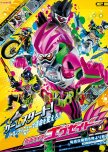
Esta resenha pode conter spoilers
Mild spoilers ahead:
Everything the show did well:-Really likeable cast of characters overall, both in the hero and villain side.
-Really great action throughout the whole show.
-The fast pacing makes every episode feel important. It never feels like there's a filler episode or an episode that feels like a waste. Manages to properly develop the cast and expand the world in spite of said fast pacing.
-Cool world-building.
-Consistently great mysteries and reveals, almost every episode leaves you wanting more and see what happens next.
-Good story overall.
-Really unique soundtrack that stands out from other tokusatsu.
-Entertaining monsters of the week in the first quarter.
Everything the show did bad:
-The secondary rider Hiiro is pretty unlikeable from episodes 34 to 38 (and arguably ruins his character) and is the only time in the show where there's a considerable drop in writing quality, but even then it's really just the Hiiro stuff that's bad during this period, everything else is still great.
-Nico can feel like "too much of a brat" at times.
-Due to the show's fast pacing there's barely any downtime for the characters to interact and have slice of life moments.
-Taiga's backstory isn't properly shown and it's left to a Blu-ray spin-off which cheapens some of the emotional weight of his scenes.
-Despite Poppy being a really likeable character overall and arguably one of the best main girls in the franchise, she sucks as a rider as the show barely gives any reason for her to not transform. Her not transforming feels especially weird since she's canonically one of the strongest riders in the show for a while.
-The show revives too many characters to take the stakes seriously and this can make the writing feel cheap. However it's not that bad of an issue since the revived character actually serve a purpose in the show and doesn't feel like they're reviving them for the sake of it, these characters manage to be properly developed after their revival. So it's a more a divisive aspect rather than a straight up problem.
Reasons for the show's strengths:
Main producer Omori wanted to have video games as a main motif for Kamen Rider since Drive but was rejected back then. However this time he was able to convince Toei that the video game motif would do well due to the popularity of Yokai Watch at the time with children. In order to bring more realistic stakes he came up with the idea of the show having a medical motif too, due to the irony that the portrayal of life in video games was the exact opposite of a medical setting which would make for an interesting story.
Main writer Yuya Takahashi excels at making fast-paced stories and Omori created a perfect constantly changing setting to exploit his writing style as much as possible. Both of them and main director Shojiro Nakazawa were inspired by wrestling and thought making the riders lose and seem pathetic initially in order to build them up getting stronger and becoming more likeable.
Reasons for the show's problems:
Main writer Takahashi didn't know on what direction to Take Hiiro's character which led to his actions in the final arc.
Both Omori and Takahashi wanted to write the specials and movies in away that coordinated with their release so that they could relate them to the episodes of the show, and also to improve the pacing of the show. But due to this stuff like Taiga's backstory ended up being relegated to the Blu-ray special.
The popularity of certain characters led to their revivals, however these were at least made with enough anticipation that these characters were written with enough purpose.
Overall:
This show's is a great time overall but whether you love the show or not will hugely depend on how lenient you are on character revivals and how much you enjoy the cast. I still would recommend this show to any Kamen Rider fan or if you're into modern shounen anime/manga.
Esta resenha foi útil para você?
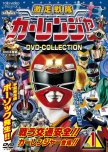
-Really likeable cast from the heroes, to the villains and the sidecharacters.
-Consistently hilarious show from start to finish, easily the funniest Super Sentai show.
-Cool and funny action from start to finish both in mech and outside.
-Despite the show hardly ever taking itself seriously it manages to give every member of the team and even the mentors proper focus, give the villains development and make them feel like a proper threat and even manages to have a pretty endearing romance.
-Really great soundtrack.
Everything the show did bad:
-The final main antagonist Exhaus somehow manages to be kinda boring and forgettable in spite of his ridiculous goal.
-Radietta gets recasted with a worse actress later on in the show.
Reasons for the show's strengths:
Due to comedy anime generating more ratings than the previous Sentai season Ohranger, main producer Shigenori Takatera wanted to make a comedy focused Sentai unlike any before. He got Yoshio Urasawa to be the main writer because his experience on writing comedy anime and his work on the Toei Fushigi no Comedy series, in spite of him not having worked on Sentai before nor having seen any Sentai season prior getting involved in production. All of this led to the show being extremely unique plus also serving as an official parody to Super Sentai, Urasawa's experience with comedy really payed off and allowed the show to be consistently hilarious.
Reasons for the show's problems:
Despite the attempts of Exhaus to parody previous Sentai antagonists, the previous villains just were way funnier and original.
Due to Megumi Hamamatsu's poor health she couldn't continue her role as Radietta. The actress later alleged that reason she left was due to her being bullied by the co-stars Yuka Motohashi and Atsuko Kurusu, but it was later evidenced that Megumi was lying about this and ended up being sued for defamation. Considering this, maybe her 'illness' at the time was a lie too, since that case wasn't the only time she was caught for being a compulsive liar, and her leaving just mostly devolves on that actress just being a legitimately bad person.
Overall:
This show is extremely hilarious and manages to be a good Super Sentai show in all the aspects that matter. Highly recommend this show to anyone who's into comedic tokusatsu or absurdist comedy.
Esta resenha foi útil para você?
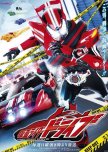
-Really great cast overall from both the heroes and villains side.
-The Roidmudes generals are among the best villains in the franchise.
-Everyone in the hero side is useful, specially this show's main girl Kiriko who is one of, if not the best main girl in the franchise.
-Pretty great action.
-Great final arc.
-Good plot overall.
Everything the show did bad:
-The show has a really slow start, this is mostly due the monsters of the week being amongst the franchise's worst, almost Wizard-tier and doesn't help how easy it's to predict the outcome of the cases if you've seen other tokusatsu. Since the main villains are barely involved in the first quarter aside of Machine Chaser who doesn't have a personality due to plot reasons, these make the beginning feel really draggy. However it's more stomachable due to how likeable the main hero cast is and by the second half they drop the monster of the week aspect.
-Mach/Go drops his lighthearted personality fairly early on and comes of as a jerk during most of the show's middle but at least he manages to be a really likeable character by the end.
-The Sigma Circular fight in the finale feels forced.
Reasons for the show's strengths:
The show's producer Omori is good at coming of with cool motifs and executed the car motif in a very different way from other tokusatsu.
The main writer Riku Sanjo is really great at writing characters and at world-building.
The popularity of Baron from Gaim lead to the creation of Chase but Sanjo and Omori didn't want to repeat concepts of previous shows and managed to make a pretty unique execution of the rival concept and it was done really well.
Reasons for the show's problems:
I honestly am at a complete loss a to what caused the first half's monster of the week so repetitive. Main producer Omori seemingly didn't request this idea in fact it seems that he was the one who requested for the show to become more serialized in the second half. Main writer Riku Sanjou is really great at writing episodic monsters of the week, even when they're 2-parters. Heck, his previous rider show W was good at having mystery-focused monster of the week. I guess he can be inconsistent since he made Ziga which was a pretty mediocre manga but I honestly felt that it could have been an issue of the manga's editor. He also was the main writer of Digimon XROSS which sucked but in that show the problem was that he barely actually wrote in the show and that the show shifted producers 3 times. The problem also cannot be this show having multiple side writers since he wrote most of the episodic stuff, W was made in the same conditions and the most recurring secondary writer was Keiichi Hasegawa who mostly wrote for the second half.
The only reasoning that comes to mind is that he already had a story draft prior to TV Asahi requesting the show to have detectives (which is honestly weird since this is the only time that comes to mind where TV Asahi had a major creative decision in a Toei's Tokusatsu since the early 90s) so he head to impromptuly scrap it resulting in the first arc being more sloppily written but even that feels far-fetched since that seemingly happened way too early in the pre-production to be a real issue.
Overall:
Really great show overall, its start drags it down but not by much and still manages to be a great time overall. Highly recommend to tokusatsu fans or to fans of lighthearted cop dramas.
Esta resenha foi útil para você?


